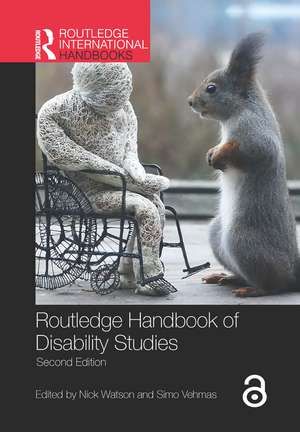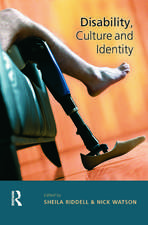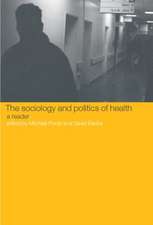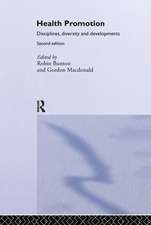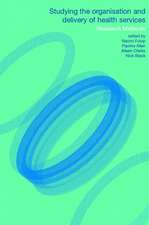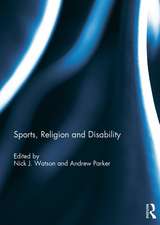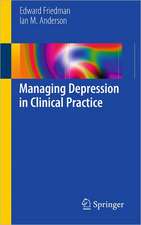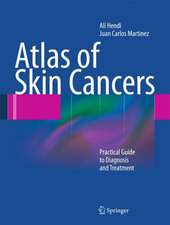Routledge Handbook of Disability Studies
Editat de Nick Watson, Alan Roulstone, Carol Thomasen Limba Engleză Paperback – 26 sep 2022
Divided in five parts, this comprehensive handbook covers:
- Different models and approaches to disability
- How key impairment groups have engaged with disability studies and the writings within the discipline
- Policy and legislation responses to disability studies and to disability activism
- Disability studies and its interaction with other disciplines, such as history, philosophy, sport, and science and technology studies
- Disability studies and different life experiences, examining how disability and disability studies intersects with ethnicity, sexuality, gender, childhood and ageing
Chapter 6 of this book is freely available as a downloadable Open Access PDF at http://www.taylorfrancis.com under a Creative Commons Attribution-Non Commercial-No Derivatives (CC-BY-NC-ND) 4.0 license.
| Toate formatele și edițiile | Preț | Express |
|---|---|---|
| Paperback (2) | 329.09 lei 22-36 zile | +38.29 lei 6-12 zile |
| Taylor & Francis – 26 sep 2022 | 329.09 lei 22-36 zile | +38.29 lei 6-12 zile |
| Routledge – 26 feb 2014 | 492.80 lei 22-36 zile | +34.77 lei 6-12 zile |
| Hardback (1) | 1336.15 lei 43-57 zile | |
| Taylor & Francis – 29 oct 2019 | 1336.15 lei 43-57 zile |
Preț: 329.09 lei
Preț vechi: 346.42 lei
-5% Nou
Puncte Express: 494
Preț estimativ în valută:
62.99€ • 68.45$ • 52.95£
62.99€ • 68.45$ • 52.95£
Carte disponibilă
Livrare economică 31 martie-14 aprilie
Livrare express 15-21 martie pentru 48.28 lei
Preluare comenzi: 021 569.72.76
Specificații
ISBN-13: 9781032376189
ISBN-10: 103237618X
Pagini: 562
Ilustrații: 22
Dimensiuni: 174 x 246 x 43 mm
Greutate: 0.91 kg
Ediția:2
Editura: Taylor & Francis
Colecția Routledge
Locul publicării:Oxford, United Kingdom
ISBN-10: 103237618X
Pagini: 562
Ilustrații: 22
Dimensiuni: 174 x 246 x 43 mm
Greutate: 0.91 kg
Ediția:2
Editura: Taylor & Francis
Colecția Routledge
Locul publicării:Oxford, United Kingdom
Public țintă
Postgraduate and UndergraduateCuprins
List of figures
List of tables
List of contributors; Part I: Theorising Disability; 1. Disability studies: Into the multidisciplinary future Simo Vehmas and Nick Watson; 2. Understanding the Social Model of Disability: past, present and future Colin Barnes; 3. Critical Disability Studies: rethinking the conventions for the age of postmodernity Margrit Shildrick; 4. "Minority Model: From Liberal to Neo-Liberal Futures of Disability" David Mitchell and Sharon Snyder; 5. The ICF and Its Relationship to Disability Studies Jerome E. Bickenbach; 6. Disability and Human Rights Lucy Series New Addition; 7. Fear, pity and disgust: Emotions and the non-disabled imaginary Bill Hughes; 8. Psycho-emotional disablism: The missing link? Donna Reeve; 9. The Biopolitics of Disability and Animality in Harriet McBryde Johnson Jan Grue and Michael Lundblad; 10. Some problems with disability research Nick Watson; Part II: Theorising impairment and impairment effects; 11. Deaf identities in disability studies: with us or without us? Jackie Leach Scully; 12. Theorising the Position of People with Learning Difficulties within Disability Studies: Progress and pitfalls Kirsten Stalker; 13. Long term disabling Conditions and Disability Theory Sasha Scambler; 14. Critical realism and the ‘fourth wave’: Deepening and broadening social perspective on mental distress Richard Brunner; 15. It’s about time! Understanding the Experience of Speech Impairment Kevin Paterson; 16. Blindness. Sightedness: Disability studies and the defiance of di-vision Ben Whitburn and Rod Michalko; Part III: Social Policy and Disability: Health, Personal Assistance, Employment and Education; 17. Social Suffering in the Neoliberal Age: Surplusisty and the partially Disabled Subject Karen Soldatic; 18. Disabled People and Employment: A UK Perspective Rosa Morris; 19. Disability Studies, Inclusive Education & Exclusion. Michele Moore, Roger Slee; 20. Independent living and the failure of governments Charlotte Pearson; 21. Diagnosis as Social Practice and the Possibility of Interruption Scott Danforth; 22. Boundary maintenance: Exploring the intersections of disability and migration Nicola Burns; 23. Disability in developing countries Tom Shakespeare; Part IV: Disability Studies and Interdisciplinarity; 24. The Metanarrative of Disability: Social encounters, cultural representation and critical avoidance David Bolt; 25. What can philosophy tell us about disability? Simo Vehmas and Christopher A. Riddle; 26. The Psychology of Disability Dan Goodley; 27. Challenging the Impairment/Disability Divide: Disability History and the Social Model of Disability Michael Rembis; 28. Disability, sport and physical activity Brett Smith and Andrew C. Sparkes; 29. We have never been able-bodied: thoughts on dis/ability and subjectivity from Science and Technology Studies Vasilis Galis; Section V: Contextualising the Disability experience; 30. Feminism and Disability: A Cartography of Multiplicity Ana Bê; 31. Disability and sexuality Xanthe Hunt; 32. Race/ethnicity and disability studies: towards an explicitly intersectional approach Deborah Stienstra; 33. Mothering and Disability: from eugenics to newgenics Claudia Malacrida; 34. Understanding disabled families: Replacing tales of burden with ties of interdependency Janice McLaughlin; 35. ‘I Hope He Dies Before Me’ – Unraveling the Debates About Aging and People with Intellectual Disability Christine Bigby; Index
List of tables
List of contributors; Part I: Theorising Disability; 1. Disability studies: Into the multidisciplinary future Simo Vehmas and Nick Watson; 2. Understanding the Social Model of Disability: past, present and future Colin Barnes; 3. Critical Disability Studies: rethinking the conventions for the age of postmodernity Margrit Shildrick; 4. "Minority Model: From Liberal to Neo-Liberal Futures of Disability" David Mitchell and Sharon Snyder; 5. The ICF and Its Relationship to Disability Studies Jerome E. Bickenbach; 6. Disability and Human Rights Lucy Series New Addition; 7. Fear, pity and disgust: Emotions and the non-disabled imaginary Bill Hughes; 8. Psycho-emotional disablism: The missing link? Donna Reeve; 9. The Biopolitics of Disability and Animality in Harriet McBryde Johnson Jan Grue and Michael Lundblad; 10. Some problems with disability research Nick Watson; Part II: Theorising impairment and impairment effects; 11. Deaf identities in disability studies: with us or without us? Jackie Leach Scully; 12. Theorising the Position of People with Learning Difficulties within Disability Studies: Progress and pitfalls Kirsten Stalker; 13. Long term disabling Conditions and Disability Theory Sasha Scambler; 14. Critical realism and the ‘fourth wave’: Deepening and broadening social perspective on mental distress Richard Brunner; 15. It’s about time! Understanding the Experience of Speech Impairment Kevin Paterson; 16. Blindness. Sightedness: Disability studies and the defiance of di-vision Ben Whitburn and Rod Michalko; Part III: Social Policy and Disability: Health, Personal Assistance, Employment and Education; 17. Social Suffering in the Neoliberal Age: Surplusisty and the partially Disabled Subject Karen Soldatic; 18. Disabled People and Employment: A UK Perspective Rosa Morris; 19. Disability Studies, Inclusive Education & Exclusion. Michele Moore, Roger Slee; 20. Independent living and the failure of governments Charlotte Pearson; 21. Diagnosis as Social Practice and the Possibility of Interruption Scott Danforth; 22. Boundary maintenance: Exploring the intersections of disability and migration Nicola Burns; 23. Disability in developing countries Tom Shakespeare; Part IV: Disability Studies and Interdisciplinarity; 24. The Metanarrative of Disability: Social encounters, cultural representation and critical avoidance David Bolt; 25. What can philosophy tell us about disability? Simo Vehmas and Christopher A. Riddle; 26. The Psychology of Disability Dan Goodley; 27. Challenging the Impairment/Disability Divide: Disability History and the Social Model of Disability Michael Rembis; 28. Disability, sport and physical activity Brett Smith and Andrew C. Sparkes; 29. We have never been able-bodied: thoughts on dis/ability and subjectivity from Science and Technology Studies Vasilis Galis; Section V: Contextualising the Disability experience; 30. Feminism and Disability: A Cartography of Multiplicity Ana Bê; 31. Disability and sexuality Xanthe Hunt; 32. Race/ethnicity and disability studies: towards an explicitly intersectional approach Deborah Stienstra; 33. Mothering and Disability: from eugenics to newgenics Claudia Malacrida; 34. Understanding disabled families: Replacing tales of burden with ties of interdependency Janice McLaughlin; 35. ‘I Hope He Dies Before Me’ – Unraveling the Debates About Aging and People with Intellectual Disability Christine Bigby; Index
Notă biografică
Nick Watson is Professor of Disability Research and Director of the Centre for Disability Research at the University Glasgow, UK. He has written on a range of disability issues including disability and technology, disability and identity and disability theory. He is on the executive editorial board of Disability & Society and is Director of What Works Scotland.
Simo Vehmas is Professor of Special Education at Stockholm University, Sweden. He has written on various theoretical and ethical issues such as the ontological formation of disability and the moral significance of intellectual disability regarding moral status and sexuality.
Simo Vehmas is Professor of Special Education at Stockholm University, Sweden. He has written on various theoretical and ethical issues such as the ontological formation of disability and the moral significance of intellectual disability regarding moral status and sexuality.
Descriere
This fully revised and expanded second edition of the Routledge Handbook of Disability Studies takes a multidisciplinary approach to disability and provides an authoritative and up-to-date overview of the main issues in the field around the world today.
